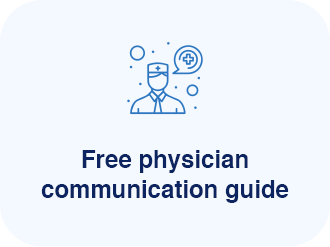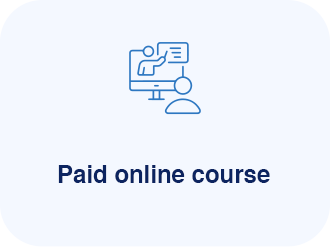Are you experiencing challenges from benzodiazepine withdrawal? Or were you prescribed benzodiazepines?
If you're looking for information about benzodiazepines and benzo withdrawal, check out this free education!

We’re a free educational resource for benzodiazepine cessation and withdrawal
This free benzodiazepine withdrawal resource is designed to provide education and help you succeed in stopping these medications. We understand the struggles of benzo withdrawal, which is why we offer free educational tools to help you understand and mitigate the difficulties when stopping benzos.
This resource was created by someone with lived experience in benzodiazepine withdrawal during a multi-year withdrawal that was mismanaged by his physician. With over two decades of experience as a Paramedic and Registered Nurse, he chose to create this resource to help and protect others.
We’ll provide you with a wealth of resources to use during your withdrawal from benzos. Combine our resources and the Ashton Manual with a knowledgeable healthcare provider and let’s create a support system that will help you during this difficult journey.
No one should go through this alone. Use our resources and create a path forward in your benzodiazepine cessation.
Ready to learn about what we have to offer? Here's more information!
Our goal is to be a free resource to help you during your benzo journey

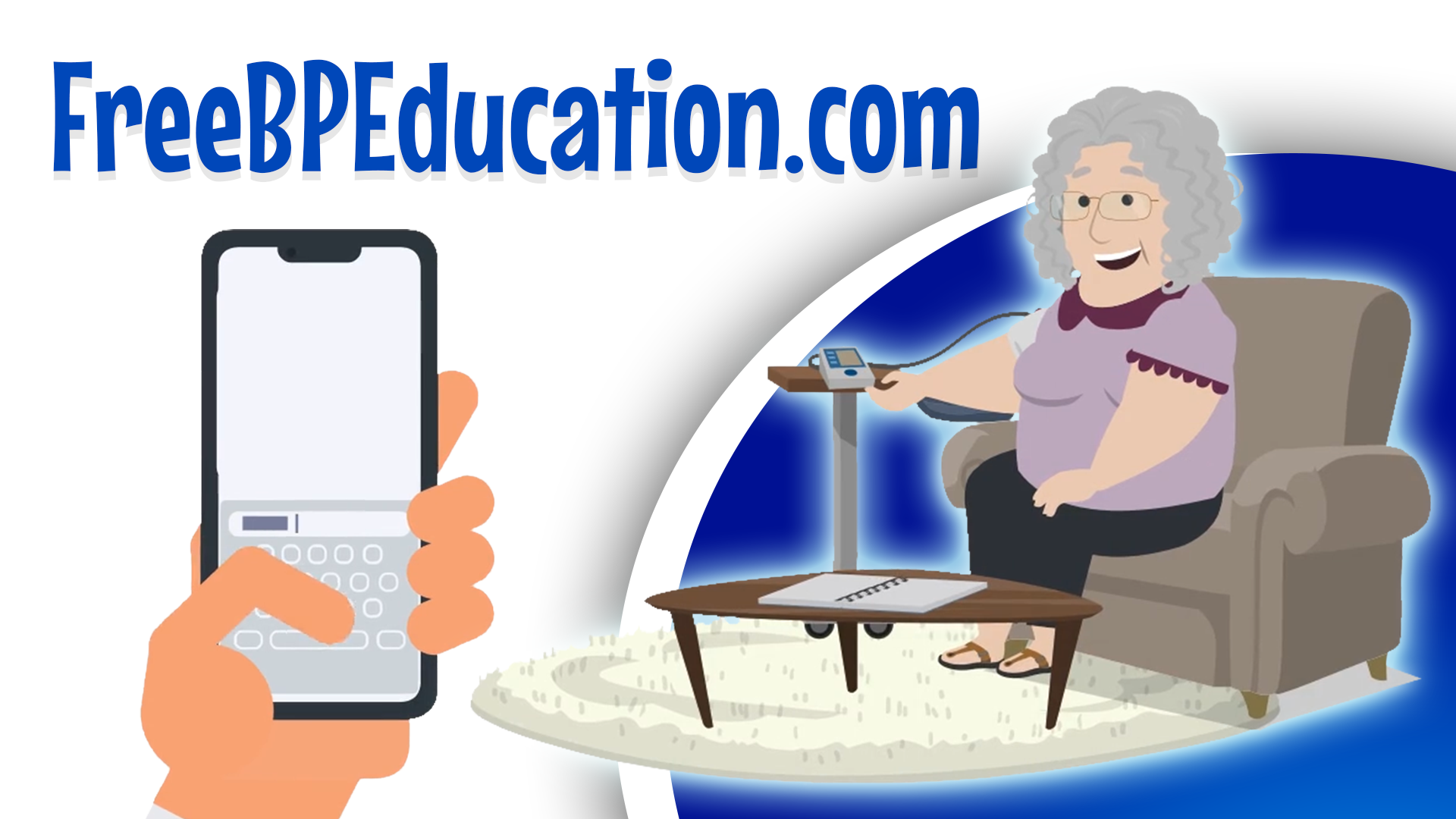
Our free eBook is filled with information to get you started on your benzo journey in a short, easy-to-read format
Developed to provide an overview of benzodiazepines and withdrawing from these medications, our eBook is available to help you learn more about this complicated topic. Your health matters! Start your benzo journey by reading our eBook to learn more.
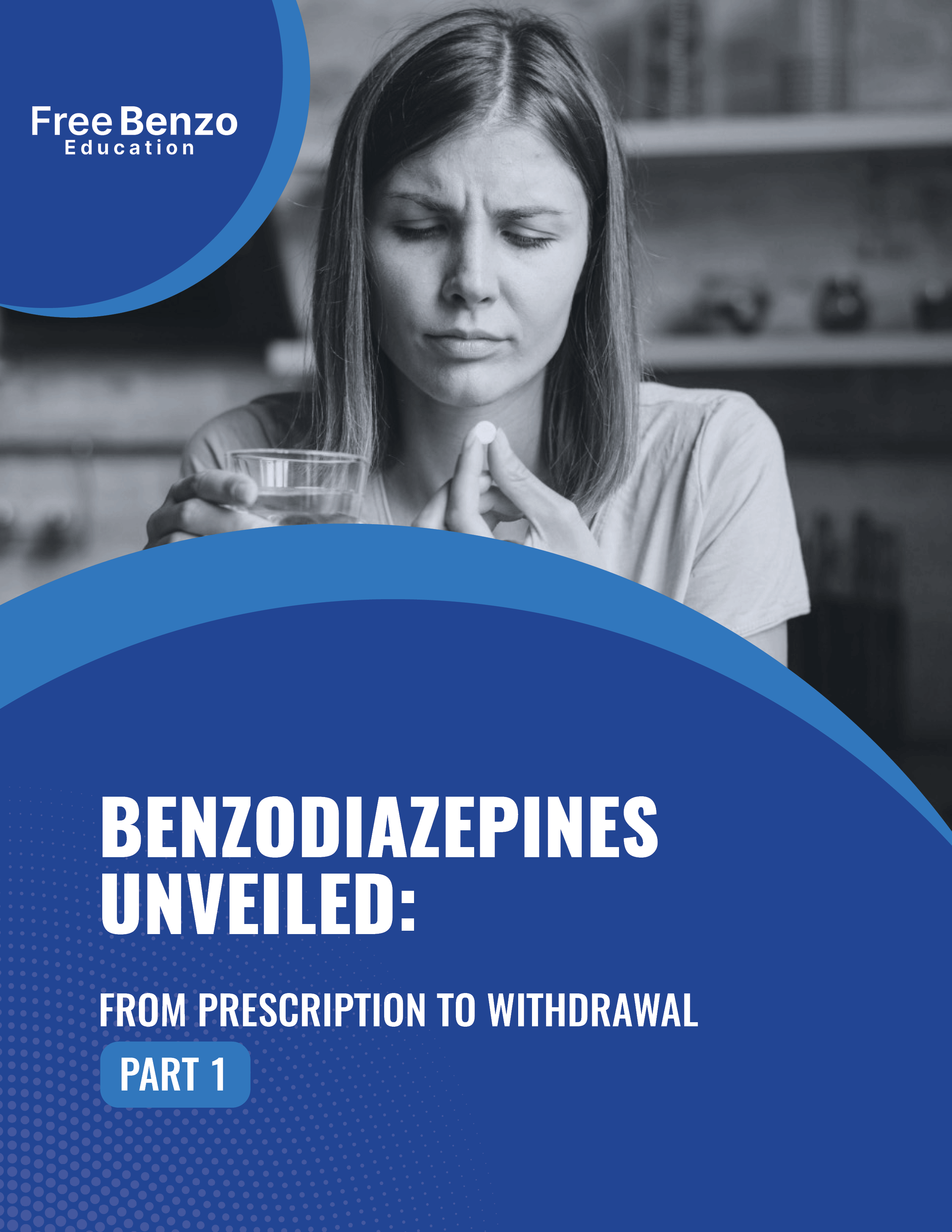



Start your journey by understanding benzodiazepines
Benzodiazepines (also called tranquilizers, benzos, or BZDs) are medications that relieve anxiety and cause sedation. Physicians often prescribe them to relieve anxiety, insomnia, muscle spasms, or seizures. Unfortunately, they can carry a high degree of physical and psychological dependence, which can lead to worse problems than what they were prescribed for.
Benzodiazepine medications interact with the brain and central nervous system to induce feelings of calm, drowsiness, and sleep. It’s no surprise that many people find them useful to manage the stresses of modern life. They’re commonly taken in pill form which quickly has a calming effect by alleviating symptoms.
A few of the most common benzodiazepine medications prescribed are Valium (diazepam), Xanax (alprazolam), Ativan (lorazepam), and Klonopin (clonazepam). Depending on the reason for the prescription, you may have been prescribed others, including ProSom (estazolam) or Restoril (temazepam).
Learn about benzodiazepine withdrawal with our free videos
Our animated videos provide education about benzo withdrawal in an easy-to-watch and engaging format. We’ve done our best to match each video’s content with the medical literature and provide an informational resource to help you begin your benzo education.

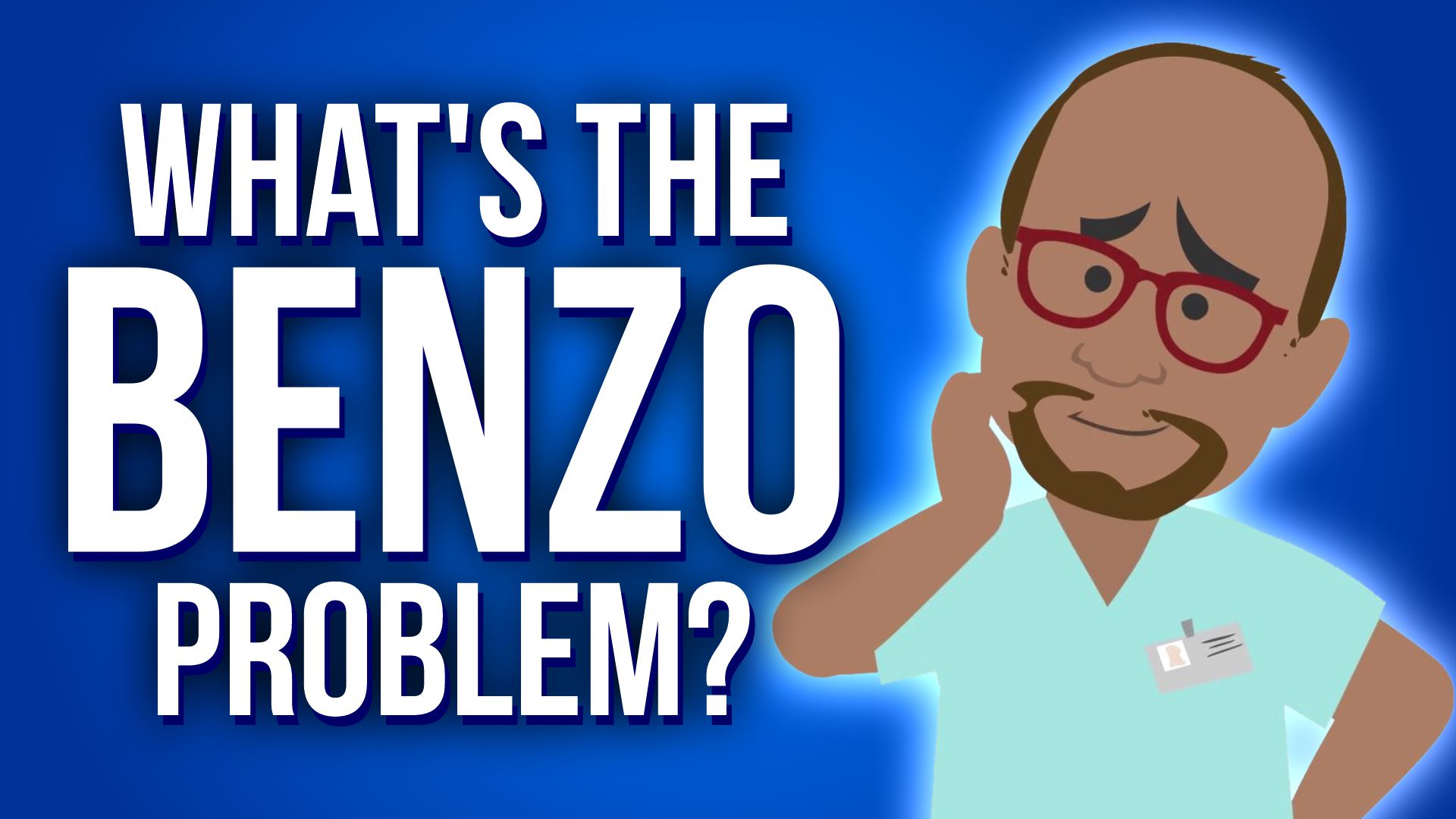
Learn about benzodiazepine withdrawal with our free videos
Our animated videos provide education about benzo withdrawal in an easy-to-watch and engaging format. Each video’s content is guided by the benzo-harmed community and has been correlated with peer-reviewed medical literature to ensure it is evidence-based.


A typical benzo withdrawal experience
Many people find benzodiazepines useful for reducing unpleasant symptoms and relaxing the body and mind. However, they’re not recommended for long periods of time due to the risk of physical dependence and a withdrawal syndrome. Developing tolerance and physical dependence can lead to increased symptoms, called rebound symptoms, or neurological dysfunction when it’s time to stop taking them. Many people will stop taking benzodiazepines without a problem. They can quit taking benzos with minimal withdrawal symptoms or none at all. Only a small percentage of individuals will experience withdrawal symptoms and have a difficult tapering process. The rate at which your benzodiazepine dose is decreased is a major factor in your withdrawal experience. For those who struggle, their withdrawal process may look similar to the following:
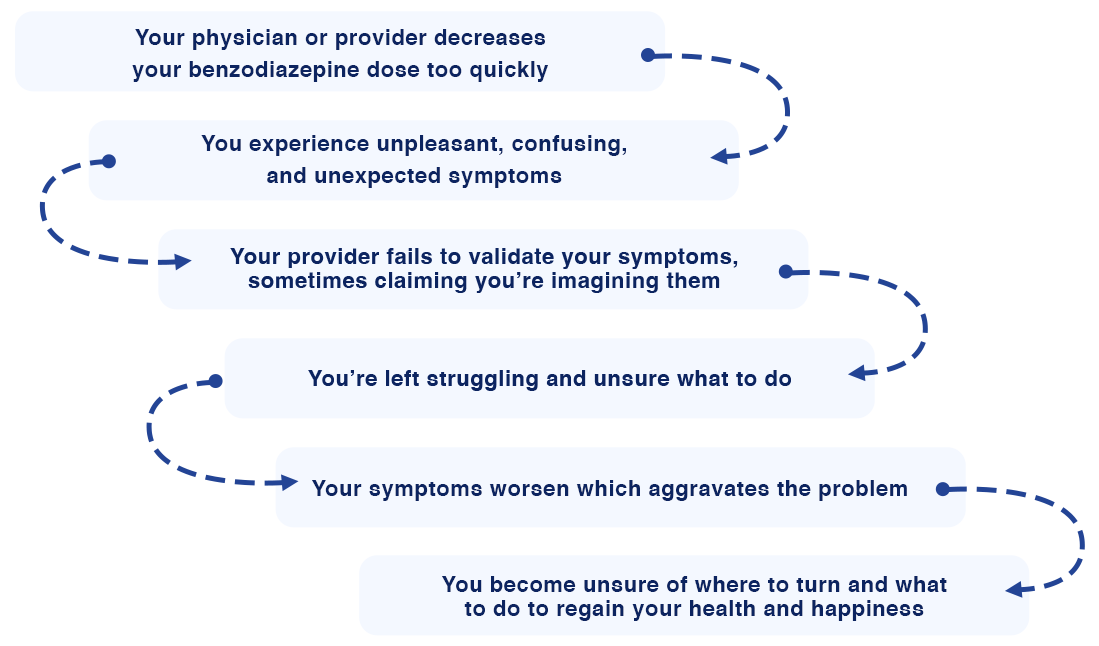
Individuals that will struggle with benzodiazepine withdrawal symptoms come from any background, age, and gender. Most have put their faith in physicians and the healthcare system and were never advised about the risks and dangers of these medications — their provider did not give appropriate education and obtain informed consent before initiating or stopping their benzodiazepine medication.
The dangers of benzodiazepine injury and withdrawal
Withdrawing from benzodiazepines can be deeply challenging and have a profound effect on your life and the people around you. While most individuals will have no withdrawal symptoms or only experience mild symptoms when stopping benzos, there is a subset of people that will endure severe withdrawals.
Although rebound symptoms may be expected, there are many lesser known symptoms such as motor and cognitive dysfunction, balance and perceptual issues, tachycardia, and tinnitus, that are physical in nature.
Of those who experience withdrawal symptoms, they may last from days to months. A small number of individuals may experience symptoms for many years and for a longer time period than you were taking the benzodiazepine. For some people, the symptoms may be permanent. This can be devastating for the individual, their friends, and family.
Some individuals coming off benzodiazepines experience a form of neurological injury that is termed BIND: Benzodiazepine-Induced Neurological Dysfunction. This term describes the changes to GABA or its receptors due to benzodiazepines. The truth is many physicians are in the dark when it comes to the risks and dangers associated with prescribing benzos. That’s why this free educational resource exists.

Our free resources for benzo withdrawal
If you’re struggling with benzodiazepine withdrawal or are preparing to stop these medications, please take a moment to discover our free resources that are designed to help during your withdrawal journey from benzodiazepines.
We can help you understand your current situation then take actionable steps to facilitate the benzo cessation and withdrawal process, including helping you communicate with your physician or healthcare provider.
Developed by someone who experienced a poorly managed benzodiazepine withdrawal, and is also a Paramedic and Registered Nurse with experience as a Legal Nurse Consultant, our free eBook is filled with information and insights to help in your benzo journey. Download it to your phone, tablet, or eReader to keep handy so you can read when it’s convenient for you!
Our YouTube videos provide a simple, easy to watch, fun way to absorb information about benzodiazepine withdrawal and how to succeed in your journey. If you’re struggling with the symptoms or complications of benzo withdrawal, you may find it more useful to watch informational videos rather than reading information from a page or screen. Our aim is to provide an easy-to-access visual resource that helps share information and support others in their withdrawal journey.
It can be challenging to get the support you need from physicians and healthcare providers. Our physician communication guide is designed to equip you with the skills to better understand the information given to you by medical professionals, describe your symptoms to your provider using medical language, protect yourself from benzo harm and injury if your provider is doubting you, and support the reality of benzo withdrawal using the medical literature.
Physician Communication Guide
It’s challenging to talk with medical professionals about benzodiazepines, withdrawal, and the physical challenges we may endure. Getting the right support can be difficult. Sometimes you may feel uncomfortable describing our symptoms and struggle to understand the information your providers give you. You may feel concerned and unheard about your withdrawal and the potential for harm.
Our physician communication guide will help you communicate your needs and concerns to your provider and gives you the information, language, and excerpts from the medical literature to help you protect your health and well-being. Using our guide, you can help your provider manage your benzo withdrawal according to evidence-based practices and the medical literature.

Dr. Ashton and the Ashton Manual
Dr. Heather Ashton was a British psychopharmacologist, physician, and professor with extensive experience with benzodiazepines. She authored medical literature, gave lectures on benzodiazepines, and ran a benzo withdrawal clinic for 12 years. Dr. Ashton helped those taking benzos stop these medications safely.
She authored the Ashton Manual for managing the benzo withdrawal process. This text recommends gradual tapering of the benzo dose rather than the abrupt cessation of the drug along with a potential crossover to diazepam, a long half-life benzodiazepine.
Benzodiazepines: How They Work and How to Withdraw, commonly called the Ashton Manual, was published in 1999. It is a respected source of information about benzodiazepine withdrawal based on Dr. Ashton’s research and experience at her benzo withdrawal clinic. The Ashton Manual is available at the link below.
Navigating Benzos:
The Basics of Benzodiazepine Withdrawal and Management
Are you or someone you know navigating the challenging journey of benzodiazepine cessation and withdrawal? Do you feel that you’re navigating this benzo journey alone and without support from your physician or healthcare provider? In this course, you’ll discover the transformative power of knowledge and prepare yourself for this difficult journey!
Why Should I Take the Navigating Benzos Course?

Informed Decision-Making
This course empowers you with knowledge and insight to navigate the complexities of benzodiazepine cessation

Safe Strategies for Stopping Benzos
Uncover the steps necessary to manage the withdrawal process, ensuring a safer transition to becoming benzo free

Symptom Prevention and Management
Learn how to identify and address withdrawal symptoms to enhance your health and well-being during this difficult process

Physician Communication
Learn the best way to discuss tapering best practices and the current medical literature with your healthcare provider to protect yourself from benzo harm and injury
Help Secure Your Benzo-Free Future for Only $299
Invest in your well-being and take the first step towards a healthier, benzodiazepine-free life and enroll in Navigating Benzos today for only $299. Don’t stay in the difficult world of benzodiazepine withdrawal alone. Empower yourself with the knowledge you need to take control of your benzodiazepine journey and path to recovery. Your journey to freedom begins with the click of your mouse.
Sign up for Navigating Benzos today and get a free, one-hour session to discuss your withdrawal journey and make a plan to get your health back and stay benzo free!

Private benzo withdrawal coaching
We’re here to support you. Our creator is a healthcare professional with almost twenty-five years of experience as a Paramedic or Registered Nurse. With lived experience through the toughest parts of benzodiazepine withdrawal and an intimate understanding of healthcare, he is uniquely suited to guide you through the withdrawal process.
If you’re looking for guidance on understanding the benzo withdrawal process, learning how to communicate your needs with your healthcare providers, and succeeding in your withdrawal journey, sign up for a free discovery session today.
I'm ready to read my free eBook about benzo withdrawal!
I want to learn more about benzo cessation, withdrawal, and what I can do to help manage the withdrawal from these medications.




